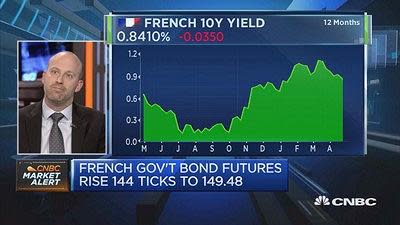Global markets soar as Macron leads in French election; CAC hits 9-year high; gold sinks 1%

France's CAC index (Euronext Paris: .FCHI) spiked to a nine-year high on Monday while Germany's DAX (Euronext Paris: .FCHI) broke through its all-time ceiling after centrist Emmanuel Macron pulled in the highest number of votes among candidates in the first round of the French presidential elections.
The euro (Exchange:EUR=) traded at a five-month high overnight on Sunday as exit poll results filtered in. Though the European currency was to extend gains on Monday as it notched its best daily high against the dollar in 10 months with Macron's first round win confirmed. The single currency rose 1.2 percent and was trading at $1.0858 by the European close. 1-month implied volatility in the currency also sank by over a third at the start of the trading week.
Equity markets in Asia tracked higher on Monday with Japan's Nikkei 225 (CBOE:.NKXQ) index ending the session up by 1.4 percent and both Australia's ASX 200 (ASX:ASX-AU) and Hong Kong's Hang Seng (Hong Kong Stock Exchange: .HSIDV) indexes in positive territory. Bucking the positive trend, China's Shanghai composite closed off by around 1.4 percent, thought to be affected by fears over domestic regulators further toughening their stance towards speculative traders.
Also trading lower was safe haven spot gold (Exchange:XAU=), around 0.8 percent lower by 4.30 p.m London time at $1,274 per troy ounce. The precious metal is often used as a hedge in times of political uncertainty though Macron's first round election victory had sparked an unwinding in safe haven trades.
Meanwhile, France's benchmark CAC (Euronext Paris: .FCHI) 40 equity index ended the session 4.1 percent higher at a nine-year high, leading gains in the U.K.'s FTSE 100 (FTSE International: .FTSE) and Germany's DAX (^GDAXI) index, up by around 2.1 percent and 3.3 percent respectively. The German index had hit a record high by Monday's European close.
U.S. equity futures also surged on Monday as the Nasdaq opened at fresh record highs and the Dow Jones industrial average soared by more than 200 points.
This as the Stoxx 600 index of the largest listed European companies moved up over 2 percent on Monday.
Nonetheless, the portfolio strategy research team at Goldman Sachs (GS) led by Peter Oppenheimer contended in a research note late on Sunday that equity markets had already largely priced in the first round outcome and they did not expect a significant equity rally from here.
"As this has largely been the central expectation priced into the markets, we would expect any rally to be modest. French domestic stocks and the CAC 40 have not underperformed significantly as of late, and we do not expect them to rally materially following today's results, or after the second round of the election."
Centrist Emmanuel Macron of the independent En Marche party secured the lion's share of votes in Sunday's preliminary election at 23.7 percent, with the far-right's Marine Le Pen of France's National Front party trailing narrowly behind at 21.7 percent, according to Harris poll estimates. Separately, the French Interior ministry announced its final figures at 5 a.m. local time on Monday morning which showed that Emmanuel Macron had won 23.75 percent of the vote versus Le Pen's 21.53 percent. With tactical voting expected to dominate in the final round scheduled for Sunday May 7 and several political heavyweights, including incumbent French Prime Minister Bernard Cazeneuve and losing first round Republican candidate Francois Fillon throwing their support behind Macron, the 39-year-old former banker heads into the showdown as the favorite. Two separate polls from Ipsos/Sopra Steria and Harris released on Sunday anticipate Macron winning around three-fifths of the vote in the final.
A closely watched proxy of investors' fear levels in recent months has been the gap between safe-haven German government bond yields and those of their French counterparts. After a spike in the spread in recent weeks, the difference between the yields at the end of last week heading into the vote had retraced to the lower level of 59.30 basis points, down from this month's high of around 75 basis points in mid-April. By 4.30 p.m. London time on Monday the spread had pulled in as tight as 42 basis points.
However, the shrinking of the yield gap between the 10-year German bunds and French OATs of the same maturity probably will not run much further, according to Tim Graf, head of macro strategy EMEA at State Street Global Markets.
"I think there has to be some sort of premium to OATs retained," Graf told CNBC Monday. He noted that the tightest the spread had ever got was around 35 basis points and current levels were not too far removed from that with two weeks – in which a lot can happen – still remaining between now and the final round of the election.
This as analysts at J.P. Morgan Cazenove called German bunds overbought and said that yields from here should move higher, in a note published on Monday.
"French bond spreads vs Germany should narrow, from three-year highs, as should the peripheral spreads to Bunds. Rising German yields and narrowing spreads are likely to help equities, and financials in particular," predicted the analysts.
Follow CNBC International on Twitter and Facebook.
More From CNBC

